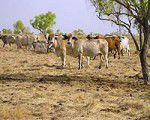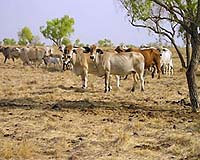Go veggie, go green, earthly benefits of vegetarianism

February 21, 2017
I became a vegetarian about one year ago because, to put it simply, I just had enough of the meat industry. I watched too many exposés, read too many condemning articles and talked to my little sister and my best friend (vegetarian and vegan, respectively) about the high costs of eating meat, until I felt that I had no other option but to say “goodbye” to meat and start calling myself a herbivore. I made the change for a variety of reasons, but the effect that the meat industry, and cattle specifically, is the nail in the coffin of my new Chick-fil-A-less life.
Now, of course, what we consume is an extremely personal form of expression. Food can comfort us, connect us to people and act as the source of livelihood. However, because eating meat is so engrained in our culture, we forget that the meat industry poses more of a threat to the environment than most other industries. As you probably know, climate change is regarded as one of (if not the biggest) issue facing the human race. Studies show that a diet containing meat requires up to three times as many resources as a vegetarian diet. Now, I don’t know about you, but I really like the Earth and I don’t want it to die anytime soon, even if cheeseburgers do taste good.
In the last 300 years, over half of the trees in the United States have been cut down in order to provide fields to grow food for livestock. This has caused soil erosion and desertification in the West, where these animals primarily graze. This overgrazing by cattle and sheep has contributed to the elimination of more plant species in the U.S. than any other cause. Additionally, the demand for cheap beef is so high that rainforests are now paying the price. Ranching there has contributed to deforestation, species extinction and an extreme loss of biodiversity. Because tropical rainforests provide a large part of the Earth’s oxygen, their destruction harms us all and contributes to the global warming problem.
Globally, farmed animals now produce more greenhouse gas emissions than the entire transport system. These emissions are produced by the digestive process of animals such as cattle and sheep. Methane is one of the three primary gasses that contribute to the accumulation of greenhouse gases in the atmosphere. To put it in perspective, methane has around 25 times the global warming impact of carbon dioxide, one of the other three greenhouse gasses. Cows and sheep are responsible for 37 percent of the total methane generated by human activity. Nitrous oxide, the last of the three gasses, is almost 300 times as damaging to the climate as carbon dioxide. A whopping 65 percent of the the total quantity of the gas comes from the livestock’s manure. That being said, meat is now the single largest source of protein in all affluent nations, and the demand for meat is expected to more than double by 2050. With this increase in demand for cheap meat, animals will have to be reared more quickly and cheaply, and in the process cause further pollution, water and land usage. The increased consumption is simply unsustainable.
The Food and Agricultural Organization estimates that by 2025, 1.8 billion people will be living with absolute water scarcity. Agricultural production consumes the most freshwater out of any human activity, and farming accounts for around 70 percent of all freshwater taken from lakes, waterways and aquifers. Feeding cattle is extremely water intensive, more so than producing plants. Waste from animals wash into waterways thus polluting them and causing major problems for the surrounding environment. With the world running out of water, and access to clean water in places unavailable, this all feels incredibly wasteful and unnecessary.
With the number of people living on Earth expected to reach nine billion by 2050, our requirement for food will increase, while our resources will continue to dwindle in a world with already a large number of hungry people. If this scares you a little, it should. We need to take steps to ensure worldwide food safety, and an easy step to take to do that is to stop eating meat. If you don’t think that’s possible for your lifestyle, there are things you can still do to help. Even if you cut back meat consumption by half, or only give up beef, you are doing the world a great service. So maybe order your pizza without pepperoni. You would be doing the world, and humanity, a lot of good.








